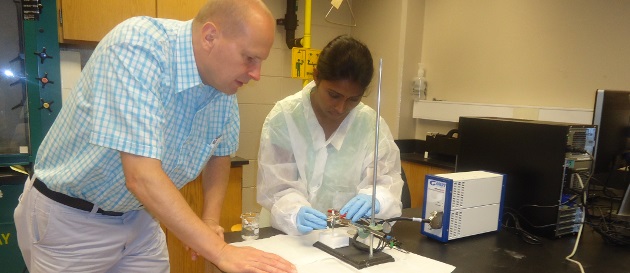
Areas of Concentration
The internationally recognized faculty within the School of Mechanical, Aerospace, and Materials Engineering are experts in fundamental areas of mechanical engineering which include but not limited to: Biomedical Engineering, Energy Processes/ Chemical Engineering, Material Science/ Engineering, Mechanical Design and Systems, and Thermal and Fluid Science/ Engineering. They participate and conduct wide array of interdisciplinary research within and outside the school. Some of the key areas of ongoing research include:
- Impact, penetration, structural dynamics, composites.
- Computer-aided analysis and design of rigid/flexible multibody systems, numerical analysis, finite element methods, and continuum mechanics, CAD/Simulation of mechanical systems, fractional derivatives and their applications.
- Non-destructive evaluation, biomedical engineering, finite element analysis, carbon composites, CAD/ CAM, machine vision, optical methods in experimental mechanics, image processing and analysis.
- Materials creep and creep fatigue, surface phenomena, carbon-carbon composites, composite materials, friction materials.
- Large scale computations of multiphase flows, phase change phenomena, and electrohydrodynamics.
- CAD/CAM, controls, vibrations, kinematics, dynamics, control and stability of flexible and rigid-body mechanical, electromechanical, mechanical-drive systems; manufacturing processes and process control.
- Friction materials, biomaterials.
- Ceramic materials, powder processing, nonstoichiometry of oxides; sintering of oxide and non-oxide ceramics, methods preparing high purity oxides from organo-metallics, perovskies for use as high temperature electrodes, synthesizing submicron carbide, nitride and boride powders.
- Nanotechnology, microchannels, heat transfer, thermodynamics, energy utilization.
- Electrochemistry, energy from coal, catalysis, reactor systems and design.
- Heat transfer, advanced energy system, computational fluid dynamics (CFD).
- Acoustics, vibroacoustics and vibration, experimental methods, simulation and modeling, fluidic control systems, smart materials in sound and vibration control.
- Electrodeposition and doping of laser semiconductors, pedagogical uses of commercial game engines for engineering 3D visualization, electrochemical STM patterning of organic masks for UV VLSI applications.
- Heterogeneous catalysis and its applications in energy processes, coal gasification, alternative energy sources, hydrogen production from coal, catalytic conversion of hydrocarbons and alcohols to hydrogen, fuel cells, nanomaterials synthesis and characterization.
